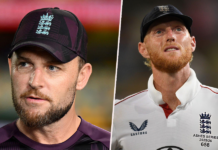In the early morning of 3 March 2009 the Sri Lankan cricket team left the Pearl Continental hotel in Lahore, boarded the team coach and set of for the Gadaffi stadium for the third day of the Test against Pakistan.
The umpires for the match followed in convoy. In the mayhem that followed seven people, including six police officers, were killed. No international team had made such a journey in Pakistan since until this week. It’s worth remembering just how horrendous that day in March was and just how long the road back has been:
“As we approached the Liberty Roundabout, I slowed down. Just then what seemed to be a rocket was fired at my coach, but it missed and I think flew over the top of the vehicle. Almost immediately afterwards a person ran in front of the bus and threw a grenade in our direction. But it rolled underneath the coach and did not seem to cause that much damage … I was shocked and stunned” – bus driver Mohammad Khalil.
“For about 20 minutes, I thought I would never be able to return to Sri Lanka alive. We were helpless and just hiding behind the seats even as the bullets were being fired and players getting injured” – Mahela Jayawardene.
“The driver, in a state of shock, stopped the bus for a couple of minutes as the bullets started hitting the windscreen a few inches above his head. I shouted ‘drive fast, drive fast’ as the gunmen started spraying bullets. If not for the heroic deeds of the driver, things would have been totally different” – Tillakaratne Dilshan.
“Having talked to Simon Taufel and Steve Davis, I think we all have the same feeling we were just waiting for a bullet to hit us. Ahsan Raza took a bullet in the stomach, chest, I think somewhere in the spleen and the lung region. I was actually lying behind him in the van, bullets were flying all around us. I only noticed he was injured when this huge pool of blood spilled out of his back, spilled out onto the van floor and out of the partially opened door. I couldn’t think what to do. I tried to comfort him. I placed my hand on his back but he was clearly critically injured. He is just an umpire, he just wanted to umpire, he loved the game” – Chris Broad.
“This was a planned terrorist attack. They had heavy weapons … They are trained criminals. They were not common people. The kind of weaponry they had, the kind of arms they had, the way they attacked … they were not common citizens, they were obviously trained” – Salman Taseer, governor of Punjab.
“Today is a grim day for sport. The game of cricket brings players, spectators and nations together in a common, peaceful, purpose, and this appalling attack is a grotesque violation of that. Our thoughts are with the Sri Lankan cricketers and with the families of the Pakistani police officers who died protecting them” – Andy Burnham, secretary of state for culture, media and sport.
“I don’t regret coming to play cricket. That is what we have done all our lives. That is our profession … I regret what has happened and the situation that we have gone through. All we want is to go back home to our families and get back home and be safe. That is all I can think now” – Kumar Sangakkara.
“It is very obvious that the landscape and the thinking has changed dramatically … We are going to have to re-evaluate what we do and where Pakistan plays its cricket,” Haroon Lorgat, ICC chief executive.
“How do you expect a foreign team to come to Pakistan now? We took pride in hosting our guests. This image has taken a beating. It’s sad for Pakistan” – Wasim Akram.
“Preparations for the World Cup will start much before 2011 and no country would want to come now to Pakistan. As I said, we will know the extent of damage to our cricket in some time. So I am worried where Pakistan will get a chance to play, not only in Pakistan but outside as well. This is all so sad” – Inzamam-ul-Haq.
“You never feel vulnerable until something like this, then you’re always feeling vulnerable. Wherever we go in the world we have very good security but I suppose this proves that, no matter how much security, there is always a chance that something can happen. One argument that was used is that it was very unlikely cricketers would be targeted. Clearly that has been proved wrong. That’s not a good situation for cricketers. But people have died and that’s more important than us thinking about any future tours and that sort of stuff. It’s been a terrible day for the game of cricket and the families of the victims” – Andrew Strauss.
“This is a Muslim country. There are no nightclubs here. For entertainment there is cricket or you can go to a restaurant with your family. But the first priority is cricket. When we play cricket, or watch cricket, we feel so happy” – 28-year-old Shahzad Mehmood, who visited the site of the terror attack to lay flowers.
“The colonial hangover was removed by the cricket team. When I started we were the generation that couldn’t possibly think of beating England. Then we began beating England. Much more important than beating other teams was to beat England because they were considered the master, the ex-colonialists. It was a country regaining its honour and pride through cricket, getting that self-esteem that colonialism destroys” – Imran Khan.
“The game of cricket is next to religion in Pakistan. Of course there’s been a tragedy but the solution is not to isolate Pakistan. When a person is down, one way is to put him down further, the other thing is to give a hand of support” – Waseem Bari, former Pakistan wicketkeeper.
“We have been advised by the home ministry to postpone the tour until further notice” – Bangladesh Cricket Board media chief Jalal Yunus.
“I can’t paint the entire subcontinent under one brush, but today everyone is asking about playing in that region, full stop” – Sean Morris, chief executive of the Professional Cricketers’ Association.
“It is extremely regrettable that the Board has had to take this decision. However, our No1 priority is to deliver a safe, secure and successful event and the uncertainty created by events within Pakistan created a huge question mark over our ability to do just that” – David Morgan, the ICC president, announces the decision to remove the World Cup from Pakistan.
Six years have passed. Six years have seen Pakistan shine intermittently at two World Cups but have also seen three of their brightest stars imprisoned for spot-fixing. Six years in which cricket fans in Pakistan have been deprived of the chance to watch their team by terrorism. Six years of exile. And now, at last, we’re here:
[Zimbabwe Cricket chairman Wilson Manase] told me they are coming and they are coming with their full team but [just] for a week. They will send a security team to assess the situation, following which they will confirm the tour. So they will come in the middle of May and our efforts will be to host matches in Lahore and Karachi” – PCB chief, Shaharyar Khan.
We are very concerned about the safety of players, and any match officials who may be sent to Pakistan, should this tour go ahead. The risk assessment that we have received from Fica’s security consultants is that an international tour to Pakistan remains an unacceptable risk and teams are advised against travelling there at present. Although we are sure that the PCB will do what they can regarding a security plan, our experts advice that the risk is unmanageable. Even with the best intentions, the security environment cannot be controlled or influenced to the extent that the risk becomes acceptable” – Federation of International Cricketers’ Associations executive chairman, Tony Irish.
We are so grateful to the Zimbabwe Cricket Board for sending their team and for trusting us. We will ensure tight security for every player of the Zimbabwean team” – Subhan Ahmed, chief operating officer of the Pakistan Cricket Board.
Whatever resources we have available here in Pakistan we will utilise them to ensure a peaceful tour for the Zimbabwean team. This is a test case for Pakistan and we are hopeful to prove our abilities for hosting and providing foolproof security to any international team” – Shuja Khanzada, home minister of the Punjab.
I would like to indicate to the world – especially the Test-playing nations – that Pakistan is a safe country to play cricket … I can tell you that players were never reluctant. They were always ready to go, we never had any dissent within. All players who were selected did come. We are safe, the players are safe and there is no problem” – Wilson Manase.
Last Friday international cricket returned to Lahore, with Zimbabwe taking on Pakistan in a Twenty20 game. The first ODI back in the country is taking place on Tuesday. The Gaddafi stadium has been packed. A wider return clearly isn’t imminent – the Zimbabwean team required 60 police vans and a helicopter to transfer them from the airport and Fica’s warning is more than strongly-worded enough to prevent the rest of the cricketing world from following suit. But it’s a start. And an important one.

















